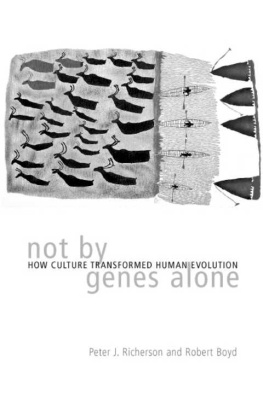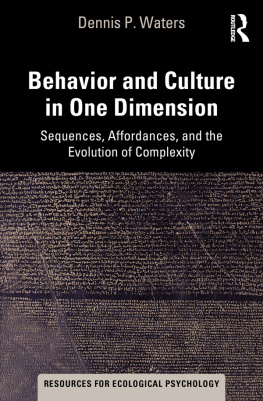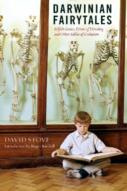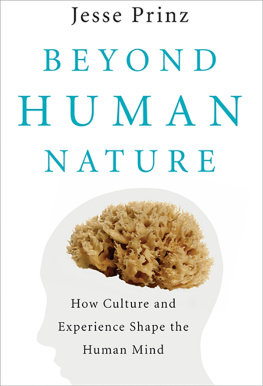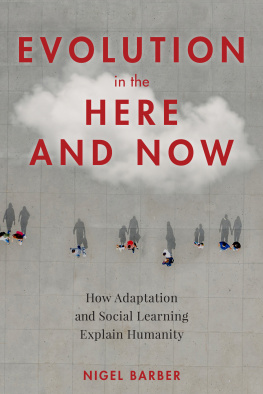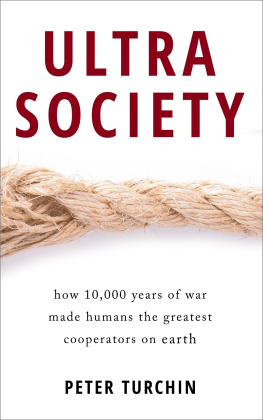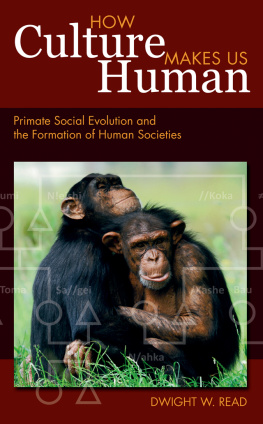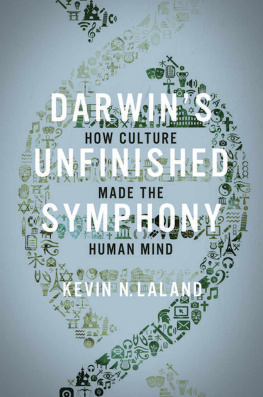Peter J. Richerson and Robert Boyd





Chapter 2
Chapter 3
Chapter 4
Chapter 5
Chapter 6
Chapter 7
The intellectual odyssey that led to this book began with some after-dinner conversations in the early 1970s. Over the years we have accumulated debts to many people, beginning with our families. Their indulgence of our preoccupation with matters of cultural evolution we much appreciate. The strong support of Don Campbell, Gerry Edelman, Ralph Burhoe, and Harvey Wheeler mattered a lot in the early days. Others who have provided substantial aid, comfort, and intellectual stimulation over the years include Robert Aunger, Howard Bloom, Chris Boehm, Sam Bowles, L. L. Cavalli-Sforza, Tom Dietz, Marc Feldman, Russ Genet, John Gillespie, Herb Gintis, Tatsuya Kameda, Hillard Kaplan, Kevin Laland, John Odling Smee, Alan Rogers, Eric Smith, Michael Turelli, Polly Wiessner, David Sloan Wilson, and Bill Wimsatt.
Our graduate students are and have been a source of much inspiration and feedback on the ideas in this book. Thanks to Alpina Begossi, Mika Cohen, Ed Edsten, Charles Efferson, Francisco Gil-White, Joe Henrich, Jen Mayer, Richard McElreath, Brian Paciotti, Karthik Panchathan, Lore Ruttan, Joseph Soltis, Bryan Vila, and Tim Waring.
PJR owes a large debt to his departmental colleagues, past and present, who have steadfastly supported his rather unusual research program. Thanks especially to chairs Francisco Ayala, Charles Goldman, Paul Sabatier, and Alan Hastings for extra help here and there. Other colleagues at Davis that have provided magnificent intellectual stimulation and other forms of support include Billy Baum, Bob Bettinger, Monique Borgerhoff Mulder, Larry Cohen, Bill Davis, Jim Griesemer, Sarah Hrdy, Bob and Mary Jackman, Mark Lubell, Richard McElreath, Jim McEvoy, and Aram Yengoyan. I am grateful to Lesley Newson and the School of Psychology at Exeter University for hosting me during the final preparation of the manuscript.
RB thanks his colleagues in the anthropology departments at Emory and UCLA for much intellectual stimulation, and for being broad-minded about what constitutes anthropology. Bradd Shore, Peter Brown, and Bruce Knauft provided generous help and advice to an anthropological novice when he was starting out. Many thanks are also due to colleagues at UCLA, especially Clark Barrett, Nick Blurton-Jones, Dan Fessler, Alan Fiske, Allen Johnson, Nancy Levine, Joan Silk, and Tom Weisner, and in the Center for Behavior, Evolution and Culture, including Martie Haselton, Jack Hirshleifer, Susanne Lohman, Neil Malamuth, Derek Penn, and John Schumann. A joint progam with UCSB has afforded stimulating interactions with Leda Cosmides, John Tooby, Donald Symons, and their students. I am also grateful to the many students in Anthropology 186P and Anthropology 120G who had to put up with the less polished and poorly copyedited versions of this manuscript that they were assigned to read. Moreover, I benefited from the time and intellectual stimulation of a year at the Wissenschafts- kolleg zu Berlin; many thanks to the kolleg staff and the fellows, especially John Breuilly, Martin Daly, Orjan Ekeberg, Alex Kacelnik, John McNamara, and Margo Wilson. I have also benefited from many interactions with my colleagues in the MacArthur Preferences Network, including Sam Bowles, Colin Camerer, Catherine Eckel, Ernst Fehr, Herb Gintis, David Laibson, and Paul Romer. I worked on early drafts of this book at Baboon Camp, Maun, Botswana, and am thankful to Dorothy Cheney and Robert Seyfarth for their many courtesies there. Finally, of course, there are Joan, Sam, and Ruby, whose love and support is the foundation of everything.
Many people read all or part of this book and helped us improve the various drafts. Sandy Hazel, Christie Henry, Joan Silk, and Eric Alden Smith provided particularly thorough editorial comments. Other readers included Sam Bowles, Peter Corning, Richard McElreath, Russ Genet, Peter Godfrey-Smith, Ed Hagen, Kim Hill, Robert Hinde, Daniel Tessler, Gary Marcus, Lesley Newson, John Odling Smee, Luke Rendell, Kim Sterelny, Hal Whitehead, and several anonymous reviewers. A UCD Animal Behavior 270 class, co-taught with Monique Borgerhoff Mulder, Tim Caro, and John Eadie, read and critiqued a complete draft of the book.
We began this book during The Biological Foundations of Culture, a project directed by Peter Weingart at the Center for Interdisciplinary Research at the University of Bielefeld. Participants provided us with much useful feedback, particularly Monique Borgerhoff Mulder, Leda Cosmides, Bill Durham, Bernd Giesen, Peter Hejl, Sabine Maasen, Alexandra Maryan- ski, Sandra Mitchell, Wulf Schievenhovel, Ullica Segerstrale, Peter Meyer, Nancy Thornhill, John Tooby, Jonathan Turner and Peter Weingart.
Christie Henry and her team at the University of Chicago Press provided all the editorial support authors could hope for, and under trying circumstances too.
The American South has long been more violent than the North. Colorful descriptions of duels, feuds, bushwhackings, and lynchings feature prominently in visitors' accounts, newspaper articles, and autobiographies from the eighteenth century onward. Statistics bear out these impressions. For example, over the period 1865-1915, the homicide rate in the South was ten times the current rate for the whole United States, and twice the rate in our most violent cities. Modern homicide statistics tell the same story.
In their book, Culture of Honor, psychologists Richard Nisbett and Dov Cohen argue that the South is more violent than the North because southern people have culturally acquired beliefs about personal honor that are different from their northern counterparts.' Southerners, they argue, believe more strongly than Northerners that a person's reputation is important and worth defending even at great cost. As a consequence, arguments and confrontations that lead to harsh words or minor scuffles in Amherst or Ann Arbor often escalate to lethal violence in Asheville or Austin.

